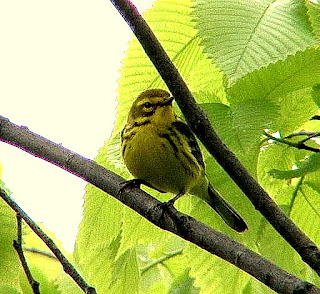 |
| At the nature preserve - a Feild Sparrow belts out the typical song of his species |
 |
| A male Prairie Warbler sings at the preserve in 2011 |
In 20 years of identifying birds by their songs, I have been
fooled many times. I recall being deceived by a Field Sparrow that instead of
singing the typical Field Sparrow "bouncing ball" song, he performed a
perfect rendition of a Prairie Warbler's song. Interestingly, the normal songs of
the 2 species are not in the least bit similar. The Field Sparrow's song is a
series of clear whistled notes that become increasingly short as it
progresses (hence the bouncing ball effect). The Prairie Warbler, by contrast,
sings a toneless song that consists of short buzzy notes given in a rapid
volley.
One thing that these 2 unrelated birds have in common is their
habitat, which is overgrown pasture land. It is thought that during a particularly
impressionable time in his development, a juvenile songbird can be greatly
influenced by the songs of other birds that are nesting in his immediate
neighborhood. So it’s possible to imagine a young Field Sparrow, that instead
of growing up to sing his father's traditional song, rebels and proudly belts
out some kind of bohemian rhythm –like that produced by the freewheeling
warblers in the next bush over. That's the way to break your father's heart,
boy!
 |
| Who are you to tell me I'm singing the wrong song? |
Well, probably not, but trying to secure
a mate of your own species when you’re not speaking the same language is at best problematic. It’s
likely that a female Prairie Warbler would be as confused as I was when she gets
a gander at who is singing. And a female Field Sparrow would have no incentive
to even get close enough to find out that this confused soul is one of her own
kind. However, it has been shown that birds with aberrant songs can succeed in
holding territories and even securing mates of their own species.
 |
| The Golden-winged Warbler that sang the wrong song for 5 years |
For about 5 consecutive breeding seasons we had a male
Golden-winged Warbler at the nature preserve that sang exactly like a Blue-winged
Warbler. This is more understandable than the former case with the Field
Sparrow, since the Golden-winged and Blue-winged are so closely related, and In
fact the 2 species regularly interbreed. Their standard songs are also quite
similar and the notes are of a similar pitch and quality. The Golden-winged Warbler sings (typically) 4 hearty buzz notes, while
the Blue-winged’s song consists of just 2 buzzy notes.
Most recently we’ve had an Eastern Towhee whose song is very
strange indeed. To me it sounded ever so vaguely like a Red-winged Blackbird’s
song, and definitely nothing like a Towhee’s normal song (often characterized
by the phrase: “Drink… your… tea”.)
Based only on the habitat that I was hearing the song emanate from, I had
thought it possible that a Towhee was producing the song, but I couldn’t be
sure on the identification until I actually saw the bird singing.
 |
| A male Blue-winged Warbler |
 |
| This Eastern Towhee will not be having any tea this morning |
In this case, I don’t think the Towhee had been influenced by
neighboring birds to sing this aberrant song. I think it’s more likely that
this bird’s syrinx (voice box) is not working properly. Or maybe this is just
his far out interpretation of the classic Drink...your…tea.
Hey, it’s also possible that he just might not want any tea.
His rendition may ultimately catch on. Perhaps someday in Central
New York, all of the Towhees will sing like him –and the great towhee tea
boycott will begin.
 |
| Unlike most female songbirds, the Female Northern Cadinal does sing |
Regional accents occur with some bird species. A resident Cardinal
singing in New York State may not be singing precisely the same song as its
cousin in Michigan. Regional accents can be even more local. For years I noted
a peculiar sounding alarm call given by Baltimore Orioles living around the
Utica Marsh and Mohawk River floodplain area. Orioles in other parts of the
County, though they give an equivalent alarm call, do not give the same calls
as their lowland counterparts.
 |
| The male Baltimore Oriole |
No comments:
Post a Comment